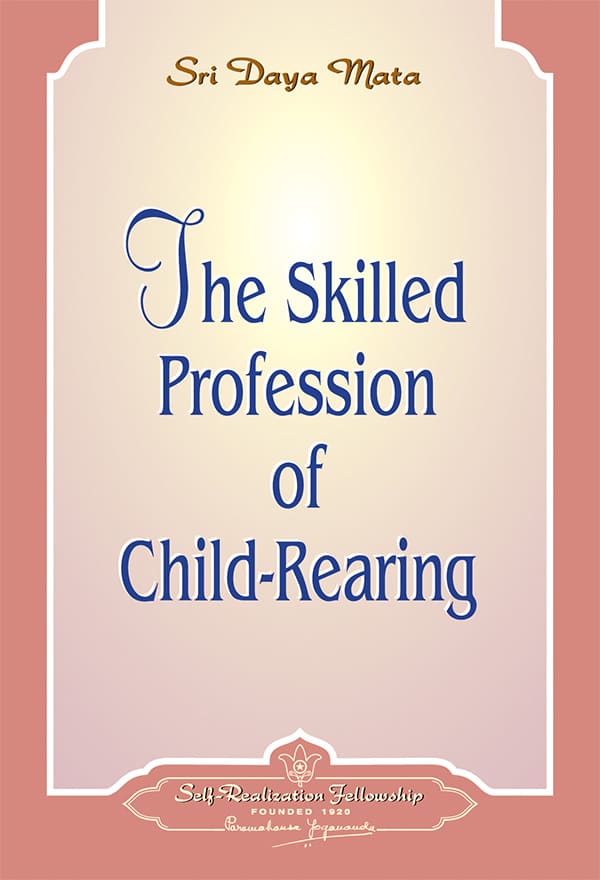Sri Daya Mata on Children and Parenting
Sri Daya Mata, foremost disciple of Sri Paramahasa Yogananda and ex-president of Self Realization Fellowship and Yogoda Satsanga Society of India, gave many talks on parenting and children. In this article you will find selections from some of her talks on this topic.

The Skilled Profession of Child-Rearing
A few quotations from the booklet

The proper training of children begins in the home. The schools have “gone to pot,” so to speak. But the deteriorating environment there is not entirely the fault of the schools. We must lay the blame where it belongs — lack of right education in the home.
The best chance for success in raising children is if the parents themselves set the right standards by their own example.
Children need discipline. I do not mean beating them; please understand that. Violence should never be used on a child! You have to guide children with firmness, but there must also be love.
If a child is given everything he wants, he does not learn the value of anything. Teach the child that he should contribute his part to the family, to his circle of friends, to his community. That prepares him to cope with what others will expect of him as an adult.
It is very important that parents understand the child’s point of view, that they always try to see things as the child sees them. Then the parents can better help the child to see the matter correctly and in the right perspective.
I don’t think the “buddy-buddy” relationship is healthy, or helpful to a child. A mother wanting to become a sister to her children is merely trying to nourish her own ego. She doesn’t want to grow up. She should be a responsible mother. And the same is true for the father.
Take time to talk with your children. Answer their questions and explain your guidance to them in language they can understand. You cannot just say, “Don’t do it.” You have to reason with the child in a way that will get him to listen.
Never force your own spiritual views on your children. Don’t say to your child, “Because I’m meditating, you’re going to meditate.” Children are like flowers; allow them to grow up and develop their own personalities. There is nothing wrong with that.
Parents are often too indulgent with their children: “I want to give my child everything I didn’t have.” Nonsense! Give him a chance to unfold, to achieve, to meet the challenges of life with your help and support so that he becomes a strong individual. You cannot protect him from every-thing, nor can you assure his happiness by catering to his whims. And in the long run, it will not help him if you try to do so.
The Love of God in the Home and Family
Excerpts from the article
Yogoda Magazine, 1997 (Jan-Mar)
Spiritual Duty of Parents
When, for example, you are caring for your children, have the consciousness that it is the Lord who has for a while placed these souls in your care; and that you will do your best not only to provide for their material needs, but to guide them and help them develop into emotionally and spiritually mature individuals. When a mother and father remember that their little ones are souls entrusted to them by God, it will remind them to manifest understanding and patience, and to learn to control themselves—their temper and disposition, their words before they speak out—in dealing with their children.
Discipline means to set and hold to guidelines that mold the child and help him to develop his mental, moral, and spiritual character.
A major source of emotional turmoil and suffering today is the lack of proper training and guidance in the home. The responsibility for the upbringing of children does not belong Primarily to the schools, but to the family. “The family that prays together stays together.” The duty of parents is to create for their children an atmosphere filled with love, understanding, confidence and self-esteem, a loving relationship with God—and to provide disciplinary guidance when necessary. But discipline is not beneficial when it is administered under the pressure of anger; parents should realize that. Discipline means to set and hold to guidelines that mold the child and help him to develop his mental, moral, and spiritual character. But what happens too often in the home is that when the parents become frustrated by the child’s behavior, they vent their emotions on the young one. As a result the child feels deep resentment; gradually a rift forms between parent and child that makes it very difficult for the parent’s good intentions to guide the child. What is necessary is to surround a child with love and at the same time teach him self-discipline. When he does wrong he must know it, and know the consequences. Reason with the child about the results his behavior will bring; and if necessary impose a suitable punishment. But never, never use harmful physical force or punish under the influence of anger.
When an individual has his mind centered in God, then it is possible for him to administer discipline I tempered with God’s qualities of compassionate justice, understanding, and love. By meditation, one absorbs God’s qualities and gains the ability to conduct oneself properly in dealing with others.
God-Centered Guidance
Excerpts from the article
YSS Magazine, 2007 (Oct-Dec)

From audience: How can parents help their children to cope with and overcome the effects and tendencies of past bad karma — the consequences of wrong actions in past incarnations?
Daya Mataji: First of all, we have to remember that each individual—whether a child or an adult —is a soul who has been born into this world with his or her own individual karma to work out. Everyone has responsibility for the karma they themselves have created in previous lives. I sometimes have to remind distraught parents of this truth when they feel guilt-ridden if their children for wrong in spite of their best parental efforts. Ultimately each soul makes his or her own choices, and present evil actions may stem from deep-seated karmic tendencies of past lives.
However, Paramahansaji explained that even though children are affected by past-life karmic tendencies, being born in a new body with a new brain and a new environment gives them a fresh start. He said: “Although children are not really children—they are aged souls of many past lives—still their former habits and attachments are pretty well covered up when they are reborn so that they have a chance to be a new in the infant life.” So parents have a special opportunity—indeed, a God-ordained duty—to help their children overcome negative past-life karma by nurturing their innate highest aptitudes.
The most effective parenting takes into account the factors that are of utmost importance in changing one’s undesirable tendencies: environment and personal effort (will power). This was understood in higher ages in ancient India and reflected in India’s traditional educational ideals. Guruji very much advocated those ideals, as you know from his writings and talks. In raising their children, parents can greatly help them by applying this wisdom. There are several ways:
- by your own moral and spiritual example;
- by providing a positive and nurturing environment in the home during their formative years; and
- by loving parental discipline that encourages the development of self-control, right attitude toward oneself and others, strength of mind and will, and an understanding of the spiritual purpose of life.
No child can grow in the best way without having the protective hedge of the father’s and mother’s loving guidance. Teach them respect for the law—God’s laws as well as society’s laws. Children are impressionable, they learn by imitation; they are much influenced by whatever good or bad role models are before them. From their earliest years onward, in addition to mentoring them by your own spiritual example, ennoble their young minds with inspiring moral and spiritual stories that entertain as well as instruct.
…discipline does not mean abuse. It means guiding your children, and correcting them when necessary, with reason and understanding—and with endless patience.
With consistency, uphold standards of proper behavior in the home, pointing out the consequences of wrong actions. However, discipline does not mean abuse. It means guiding your children, and correcting them when necessary, with reason and understanding—and with endless patience. One should not have children if one does not have patience; I must tell you that. I think it is so important. I observed in Paramahansaji, through all the years I was with him, that though he could be a strict disciplinarian when necessary, he had endless patience with all the disciples. No matter how often we erred, still we knew he loved us unconditionally. That quality is just as vital for those who would be parents.
While a warm and loving home environment is necessary for healthy child development, children today must also contend with a less-than-ideal environment outside the home—the grossness, materialism, and other negative influences and degenerate moral values rampant in mass culture. Seeds of bad karma from wrong actions of past lives readily sprout if these environmental forces are not resisted. This heightens the need for parents to help their children develop self-control, will power, and what Paramahansaji called “won’t power.”
Instead of permitting children to spend hours and hours in front of the television or on the Internet, for example, it is good to involve your children in sports or other wholesome physical activities and hobbies that require developing self-discipline, mental strength, stick-to-itiveness, concentration, and self-confidence. These qualities are necessary to overcome negative karma and degrading worldly influences. In addition, strengthen your children’s character and sense of personal responsibility by giving them duties to perform in the home (appropriate to their age, of course). Nowadays too many children grow up with a false sense of entitlement, because the father or mother spoiled them by indulging their every whim and not requiring them to earn, or even value, the privileges they are given. Parents may think that in this way they are making the children happy, but in fact they may be inculcating lifelong wrong attitudes that are a sure source of trouble.
To truly fulfill your responsibilities as a parent is not easy!* But remember : It definitely hastens your own spiritual evolution, as well as giving you the joy of hastening that of your children.
While they are young, children are generally receptive to spiritual influences because their minds, for the most part, are still very pure. Yes, they bring with them their karma from previous lives, but I remember Guruji once saying, “Up until about the age of eight, the consciousness of a child is not completely in this world; he is not fully in touch with his flesh or his senses. Thereafter, he becomes more and more engaged with this material world. But until then, he is still, to a degree, aware of that other realm from which he came.” That is why so often children will say they have seen things that their elders dismiss as fantasy. Sometimes they will talk about seeing and communicating with a loved one who has passed on. Or they may talk about Jesus, or the Lord Krishna, and tell you that they have seen them. Often this is not merely dream or imagination; it comes from their actual awareness and memory of the other world—and with discrimination that faith in a higher reality should be encouraged in them.
Cultivate the best that is within your children. Nourish them with kindness and love. Make a point of recognizing and reinforcing their positive tendencies and attributes, and support them in their efforts to be good. Draw the family together to participate in spiritual practices such as prayer and meditation, or devotional chanting and
practice of affirmations for healing and self-improvement.
To whatever degree that they are receptive, let them know how the practice of Guruji’s teachings—especially Kriya Yoga meditation when they are ready for it—can enable them to overcome past habit patterns and transform their lives for the better. Above all, encourage them from the very beginning to have deep faith in God, to develop a loving, trusting relationship with Him. That is the very basis for giving them not only the motivation but the means to free their lives from misery-making past karmic influences and present temptations, and to become settled in the inner happiness of spiritual values.
Ennobling Relationships between Men and Women
Excerpts from the article
YSS Magazine, 2002, (Oct-Dec)

Such behaviour represents too the best training you can give to your children on this subject. For them, example speaks louder than words. Our children today are the products of their upbringing: The fact that so many of them enter adulthood with little or no understanding of the ideals that make for a wholesome relationship with the opposite sex is, to a great extent, the responsibility of their parents, who are their role models in this regard. The parents’ conduct is a major influence on the behaviour of their children, and hence on what they will become.
One mistake to avoid in family life is for one parent to leave the training of the children to the other. It should be a shared responsibility, and they should try to be consistent in the guidance they give. Otherwise if one parent says “No,” the clever child is going to go right to the other parent and get a “Yes”! You will find it very difficult to bring up your young ones properly if consistency of rules and expectations is lacking. Parents should always uphold one another before their children, while helping each other to base their decisions on justice and understanding. If they have different opinions, let these be settled in private, rather than quarrelling before the children. Such inharmony can greatly disturb young minds. Our Guru spoke of the ideal example his parents set for him and his brothers and sisters: only once in his childhood did he ever see them openly disagree.
There is a great deal of self-control and emotional maturity involved in being an effective parent. If parents are nervous and irritable — perhaps worn out from a long day at work or from fulfilling household duties — often they take out their frustrations on the children. Children can sense their parents’ irritability. They will begin to feel resentment, and in time may lose respect for the parents. Then there is likely to he trouble; because if respect is gone, the children no longer have an example to look up to and follow.
Harmony in the home will grow if love is constantly cultivated between the parents. Real love thinks first of the husband or wife, and then of the children. Very often love is lost when the woman, becoming a mother, ceases to regard her first duties as a wife. (Of course, husbands too need to work at keeping their marriage a priority, but usually their attention is not diverted by the children but by other pursuits.) This doesn’t mean neglecting the young ones; rather, it results in a family environment that is secure, stable, and nurturing.
Someone has asked me, “Can we love someone and not be attached? How can we tell if the love is becoming attachment?” To this person I say, first of all: Keep in mind the real purpose behind the spiritual ideal of nonattachment to persons and things of this world. It is not to make us cold, aloof, or unloving! In any love there is a degree of attachment. For instance, I admit that I’m deeply attached to the Divine; I wouldn’t want to live one moment without that communion. Attachment in that sense is not wrong. But in human relationships, the wrong attitude to be guarded against is possessiveness.
Love - Serve : A message of Divine Fellowship
Excerpts from the article
YSS magazine: 1999, (Oct - Dec)

When love that is open and unselfish is present in the family, children will be more apt to feel they can come to the parents to discuss anything and not be met with anger, but with honest explanations and understanding. Yes, it is all right to give discipline when needed, but never punish a child when you yourself are angry. This is equally true between husbands and wives; they must be able to sit down quietly and talk patiently, each expressing what is felt in the heart, each being a helpful companion to the other. Practice the art of harmonious communication. It nurtures a relationship in which God loves to enter and reign.
A child is like a seedling; you have to cultivate it. Little ones do not grow up well if not properly tended; they need the tender, loving care and wise guidance of their parents.
Make a determination that you will teach your children the right way to live. The best instruction is to be an example yourself, isn’t that so? I urge all of you to think deeply: “What can I do, what can I say, to instill the right standards in my child?” Scolding them will not work. I think back to my mother, who was such a wonderful inspiration. She never scolded, and I never knew what it was to have a spanking from her. She only needed to speak to us. We adored her; we wanted to do what she asked. Why? Because she talked to us with love, even when she found it necessary to be firm. You mustn’t spoil your children by giving in to misbehavior; be firm in holding them to right behavior. A child is like a seedling; you have to cultivate it. Little ones do not grow up well if not properly tended; they need the tender, loving care and wise guidance of their parents. You who have children are blessed that God has given you those souls to love and nurture, to inspire and encourage. They are the makers of tomorrow, the first generation that will set the early course of the new millennium.